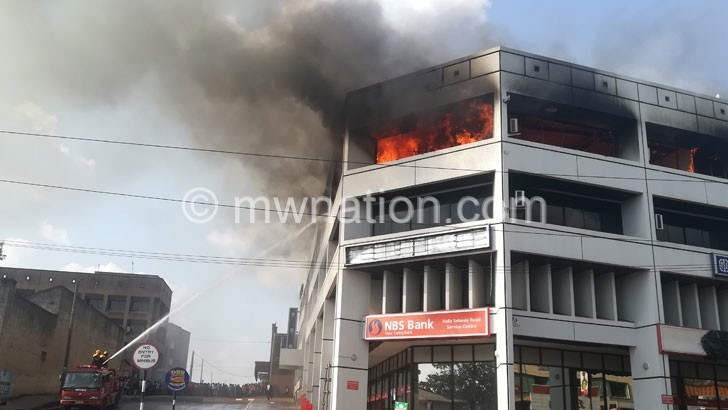Experts link politics to laxity on probes in govt
Governance and private sector stakeholders have mentioned preservation of political interests as the reason behind laxity in speeding up investigations in the public sector.
The sentiments come in the wake of the swiftness in the conclusion of investigations into the cause of the fire that destroyed the three-storey Nico House in Blantyre three weeks ago.
Nico Holdings plc managing director Vizenge Kumwenda yesterday said in an interview forensic experts from South Africa have established that the fire was caused by an electrical fault.

He said owners of the property, Nico Life Insurance Company Limited—a subsidiary of the Malawi Stock Exchange-listed financial services and investment group—have since made a claim from their sister company, Nico General Insurance Company Limited, to cover for the damages from the fire.
Ironically, in the public sector, investigations into several fires have remained inconclusive with some spanning several years. The fire incidents include that of Electricity Supply Corporation of Malawi (Escom) House a stone’s throw from Nico House in 2013, Ministry of Agriculture, Irrigation and Water Development at Capital Hill in 2017 and the Anti-Corruption Bureau (ACB) office building. The cause of a fire that in 2015 destroyed a Malawi Electoral Commission (MEC) warehouse in Lilongwe after the High Court ordered a recount of votes for a constituency in the city is also yet to be established.
Responding to an enquiry on what the public sector and private sector approaches to investigating fire incidents mean, political governance analyst Henry Chingaipe said the difference stems from a number of factors.
He said: “Fires are supposed to be accidents, but we should say there are some fires that are not accidents per se. It is in the latter kind of fires that you often see the lack of urgency to investigate the causes as a measure to protect people, be it politicians or officials who might be implicated in the saga.
“The fact that Nico Holdings has been able to deal with the investigation in about two weeks shows that the fire was genuine.”
In his assessment, Chingaipe also said government bureaucracy such as procurement procedures equally complicate matters to the disadvantage of the public sector.
But he asserted that attempts by political powers to hide the truth behind the fires create the stagnation in investigations in the public sector.
The fire at Capital Hill coincided with investigations into circumstances that led to the procurement of maize where billions of taxpayers funds were used. To date, a report is yet to be out.
Principal Secretary for Ministry of Agriculture, Irrigation and Water Development Grey Nyandule Phiri said in a telephone interview yesterday he was not aware of the status of the fire as it happened before he went there.
He said: “My priority now is to lobby for resources so that the building is rehabilitated. We are facing a huge problem of space. So, I cannot waste resources focusing on the past issues when we need to create space for our officers.”
Happy Kayuni, head of Political Sciences Department at Chancellor College—a constituent college of the University of Malawi (Unima), questioned the frequency of fire incidents in parastatals and government institutions as compared to the private sector.
In a written response, he said: “This contributes to people’s lack of confidence in public institutions. People end up speculating that something is happening to destroy evidence and that makes all stakeholders worried in as far as good governance is concerned.”
Political analyst Humphrey Mvula, a former private sector executive, described efforts to investigate fire incidents in the public sector as an ‘academic’ exercise.
“Usually, politics of the day directs as to which issues should be investigated and which ones should not. You find that sometimes the task to investigate is given to people without expertise.
“Investigating fire causes demands the presence of forensic experts. The use of ill-trained personnel is a deliberate ploy to cover up for the sins of senior officials and politicians who might be implicated if the truth was to come out.
“On the other hand, in the private sector, such decisions are based on purely business considerations. Where the risk management policies are put into practice to ensure that what happened should not be repeated,” he said.
The laxity comes amid government implementing public sector reforms designed to improve efficiency in terms of service delivery.
But in her response, Public Sector Reforms Unit chief director Seodi White defended the public sector’s handling of the matters, saying all government instituations are on mandatory insurance.
She said this demonstrated government’s commitment in terms of risk management.
Said White: “If it is a ministry, the Office of the President and Cabinet [OPC] is supposed to institute investigations. If the media does not get the reports, it might be due to lack of confidence on the information that might be released.”
In recent years, Malawi has been rocked with fire incidents affecting public infrastructure, including markets, hospitals and schools. Save for few where donors have moved in to assist, many burnt down structures have remained eye sores.n





